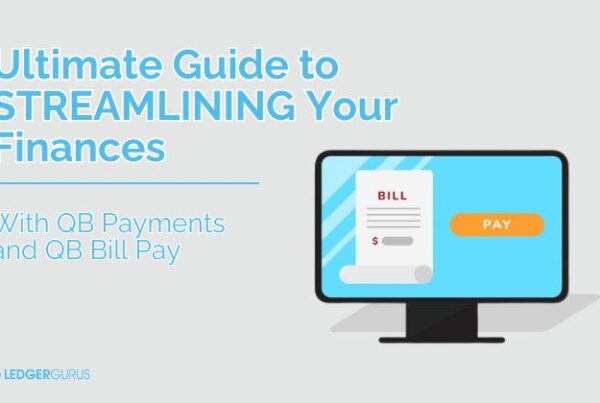Did you hear? With the release of the Intuit Enterprise Suite, Intuit is officially moving into the mid-market space.
This marks a significant shift in the strategy that Intuit has taken in the past, which was primarily focusing on the needs of SMB businesses and solo-prenuers.
I am Brittany Brown, CPA and CEO of LedgerGurus, an ecommerce focused accounting firm. I am personally very excited about this move, what it will mean for my practice, and the options it will give my clients.

So excited, in fact, that I’ve been super vocal about it and wrote this article. I’ve also been blowing Intuit up since hearing the news, talking about why I’m excited. Let me tell you what I told them.
In this blog, we’ll cover:
- Why mid-market? The client journey and realities
- From QuickBooks to ERPs: The high-stakes gap for growing businesses
- A new world with Intuit Enterprise Suite: A game-changer for growing businesses
- How LedgerGurus Can Help
Let’s get into it.
Key Takeaways
- A mid-market game-changer: Intuit Enterprise Suite finally fills the gap between QuickBooks and ERPs, giving growing businesses a way to scale without the ERP headaches.
- Upgrade without the tears: Say goodbye to costly implementations and confusing workflows. This solution lets you step up, while keeping the simplicity you love about QuickBooks.
- The best of both worlds: More features and capability without sacrificing the streamlined automation and ease that QuickBooks is known for.
No more high-stakes jumps: With lighter switching costs and smoother transitions, you can grow your business without the usual risks of outgrowing your accounting tools.
Why Mid-Market? The Client Journey and Realities
When I say mid-market, what do YOU think of?
Maybe you think of:
- Higher revenue levels
- More complexity
- High transaction volume
- Increased number of users
Maybe you think about client groups with multiple entities, intercompany transactions, and consolidations.
When I think of mid-market, I think of all my clients who jump ship from QuickBooks to go to ERPs, leaving a trail of tears in their wake.
I think of a big, black void between QuickBooks’ previous offerings and the mid-market tools.
I think of all the clients who had nowhere else to go, so they ended up seeking out an “over-solution” in the form of an ERP that cost them a fortune in implementation and took months of their lives they will never get back.
What Clients Think They’re Getting when They Switch to Mid-Market Tools
As an ecommerce focused accounting firm, we get a lot of clients looking hard at mid-market tools.
They are usually motivated by a desire to expand the functionality of QuickBooks, and then are hard sold by mid-market ERP salespeople telling them that the all-in-one solution will fix all their pains and tuck them in at night.
What They Get Instead
What the salespeople neglect to tell them is that they will be leaving behind all the streamlined functionality and automation that QuickBooks has become known for.
What was two clicks in QuickBooks will require five when they move to an ERP.
The accounting workflows they were previously able to manage with an outsourced solution of part-time staff will now require several full-time people.
They also neglect to mention that they will either need to keep a highly paid consultant on speed dial or hire an in-house system administrator just to make the system work the way they will need it to.
Often, we are not able to follow our clients into these mid-market tools, either because we don’t support the tool they are moving to (and most CAS practices don’t) or because the increased manpower required in the new tool prices them out of considering outsourced accounting solutions.
Now, on top of learning a new and complicated system, they must also hire, train, and oversee their new in-house accounting staff.
Good luck with that.
From QuickBooks to ERPs: The High-Stakes Gap for Growing Businesses
Why do companies often move to complicated mid-market solutions long before they are ready?
It’s because they’ve outgrown the capabilities of Intuit’s SMB offerings.
Unfortunately, there’s a BIG jump between small business tools, like QuickBooks, and mid-market tools, like NetSuite and Sage Intacct, without the option of taking gradual steps in between.
Trying to make that jump is like going from a cute little Volkswagen bug that maneuvers easily, zips in and out of parking spots, and gets teenagers to flirt with you, to a private plane with tinted windows and a pilot that never smiles. (What the swear word do all these knobs even do?!?)
Many of the companies that left us would have benefitted from some steps in between.
- First, they needed the sleek SUV loaded with cool features and a party fridge in the front console.
- Then they needed the class A motorhome the size of a bus with bunk beds and nice towing capacity.
- THEN they might have needed the private plane with all its whistles and bells.
Instead, many of them came back because the leap proved to be ten steps back instead of five steps forward.
They lost a TON of money in implementation costs for a failed project because they didn’t have options to step up gradually or to switch without high switching costs.
A New World with Intuit Enterprise Suite: A Game-Changer for Growing Businesses
But now… imagine a world where an “implementation” involved selecting the button that indicated you were ready to subscribe to an upgrade and just like that, all your data was in the new system.
You would just need to poke around and get accustomed to the new features that were available to you now, but all your established work flows still looked the same, with familiar screens.
You would still be “business as usual” while your team figured things out in the new system because most of the things they had been accustomed to before would just be added upon now, not completely changed.
The switching costs would be significantly lighter and would mostly come in the form of someone teaching you how to use your cool new toys instead of paying for data migration and system overhauls.
Imagine a world where maturing companies could still have the streamlined functionality and automation of QuickBooks WHILE expanding the features and capability of their system.
That is what is available with the Intuit Enterprise Suite.
Can you see now why I was so excited when this new move by Intuit was announced?!?
How LedgerGurus Can Help You on Your Ecommerce Journey
If you’re ready to take your ecommerce accounting to the next level—without the tears of jumping to an overcomplicated system—we’re here to help.
At LedgerGurus, we specialize in guiding ecommerce businesses through every stage of growth, ensuring your accounting tools evolve with you.
Whether you’re scaling up or simply need expert support, let us be your partner on this journey.
Contact us today to learn how we can help you keep your accounting simple, efficient, and perfectly aligned with your business goals.
Note: This is a paid partnership with Intuit.






